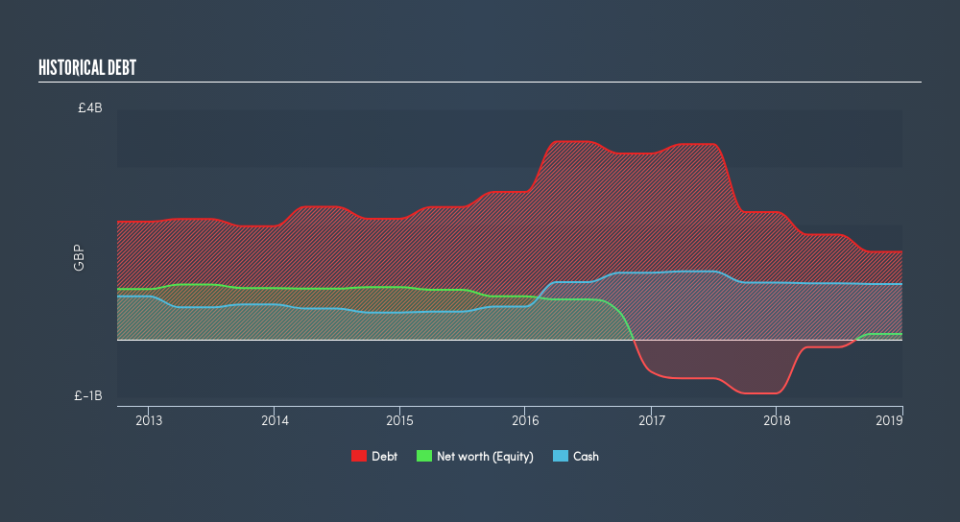Capita (LON:CPI) Has A Somewhat Strained Balance Sheet

Howard Marks put it nicely when he said that, rather than worrying about share price volatility, 'The possibility of permanent loss is the risk I worry about... and every practical investor I know worries about.' It's only natural to consider a company's balance sheet when you examine how risky it is, since debt is often involved when a business collapses. Importantly, Capita plc (LON:CPI) does carry debt. But is this debt a concern to shareholders?
When Is Debt Dangerous?
Debt is a tool to help businesses grow, but if a business is incapable of paying off its lenders, then it exists at their mercy. Ultimately, if the company can't fulfill its legal obligations to repay debt, shareholders could walk away with nothing. While that is not too common, we often do see indebted companies permanently diluting shareholders because lenders force them to raise capital at a distressed price. Of course, plenty of companies use debt to fund growth, without any negative consequences. When we think about a company's use of debt, we first look at cash and debt together.
Check out our latest analysis for Capita
What Is Capita's Net Debt?
You can click the graphic below for the historical numbers, but it shows that Capita had UK£1.53b of debt in December 2018, down from UK£2.22b, one year before. On the flip side, it has UK£967.3m in cash leading to net debt of about UK£559.3m.
A Look At Capita's Liabilities
Zooming in on the latest balance sheet data, we can see that Capita had liabilities of UK£2.36b due within 12 months and liabilities of UK£1.63b due beyond that. On the other hand, it had cash of UK£967.3m and UK£650.1m worth of receivables due within a year. So its liabilities total UK£2.37b more than the combination of its cash and short-term receivables.
When you consider that this deficiency exceeds the company's UK£1.93b market capitalization, you might well be inclined to review the balance sheet, just like one might study a new partner's social media. Hypothetically, extremely heavy dilution would be required if the company were forced to pay down its liabilities by raising capital at the current share price.
We use two main ratios to inform us about debt levels relative to earnings. The first is net debt divided by earnings before interest, tax, depreciation, and amortization (EBITDA), while the second is how many times its earnings before interest and tax (EBIT) covers its interest expense (or its interest cover, for short). Thus we consider debt relative to earnings both with and without depreciation and amortization expenses.
Capita's net debt is sitting at a very reasonable 2.1 times its EBITDA, while its EBIT covered its interest expense just 2.5 times last year. In large part that's due to the company's significant depreciation and amortisation charges, which arguably mean its EBITDA is a very generous measure of earnings, and its debt may be more of a burden than it first appears. Importantly, Capita's EBIT fell a jaw-dropping 70% in the last twelve months. If that earnings trend continues then paying off its debt will be about as easy as herding cats on to a roller coaster. There's no doubt that we learn most about debt from the balance sheet. But ultimately the future profitability of the business will decide if Capita can strengthen its balance sheet over time. So if you're focused on the future you can check out this free report showing analyst profit forecasts.
Finally, a company can only pay off debt with cold hard cash, not accounting profits. So we clearly need to look at whether that EBIT is leading to corresponding free cash flow. In the last three years, Capita created free cash flow amounting to 16% of its EBIT, an uninspiring performance. For us, cash conversion that low sparks a little paranoia about is ability to extinguish debt.
Our View
We'd go so far as to say Capita's EBIT growth rate was disappointing. But at least its net debt to EBITDA is not so bad. Taking into account all the aforementioned factors, it looks like Capita has too much debt. That sort of riskiness is ok for some, but it certainly doesn't float our boat. Given the risks around Capita's use of debt, the sensible thing to do is to check if insiders have been unloading the stock.
When all is said and done, sometimes its easier to focus on companies that don't even need debt. Readers can access a list of growth stocks with zero net debt 100% free, right now.
We aim to bring you long-term focused research analysis driven by fundamental data. Note that our analysis may not factor in the latest price-sensitive company announcements or qualitative material.
If you spot an error that warrants correction, please contact the editor at editorial-team@simplywallst.com. This article by Simply Wall St is general in nature. It does not constitute a recommendation to buy or sell any stock, and does not take account of your objectives, or your financial situation. Simply Wall St has no position in the stocks mentioned. Thank you for reading.

 Yahoo Finance
Yahoo Finance 
